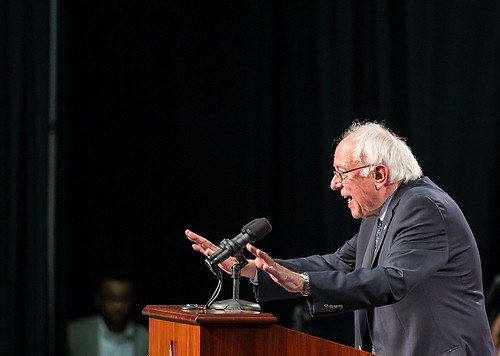Havana.
Instead of calling on his followers to abandon the electoral struggle, or asking them to massively support Hillary Clinton´s campaign, Bernie Sanders has called them to follow him in new battles consistent with the ideas he has championed and that made him the big surprise of the current US presidential elections, especially because of his influence on the younger adult segment in US society.
On June 16, According to The Nation, Sen. Bernie Sanders made a speech on the future of his political revolution that turned out to be very different from what US electoral experts predicted. It was not an explanatory statement resulting from his defeat in the Democratic Party primaries for the November elections by former first lady and former State Secretary Hillary Clinton.
Paradoxically, his words were an invitation to his millions of followers, supporters and all citizens interested in defeating Donald Trump, to continue to confront Hillary Clinton and, after obtaining political power, continuing the struggle for social justice, economic honesty, civil rights, gay rights, equality of women and respect for the environment.
Sanders reminded his followers of their extraordinary achievements and noted that his campaign had gained the support of an enormous number of “persons age 45 years or less.”
Without mentioning Hillary Clinton in the first half of his speech, he stressed that “defeating Donald Trump cannot be our only goal.” Sanders was particularly transparent, both about what is at stake in the election as about his role in that fight.
“The major political task that we face in the next five months is to make certain that Donald Trump is defeated and defeated badly,” Sanders said. “And I personally intend to begin my role in that process in a very short period of time. If we do not do it soon, the breaches of commitments of a progressive nature made by Hillary Clinton in her campaign could go unnoticed without being denounced as opportunistic presumptions,” he said.
Sanders said –as he has maintained since his candidacy was “just a flea in the polls”– that his campaign “has never been for the election of a particular candidate; it has always been to transform the United States.”
He explained that whoever wins in November, it will be of no consequence if the president-elect had not previously been committed to such transformations, namely: ending the disgrace of child poverty, excluding big money from politics, ensuring that the rich pay their fair share of taxes, making health care a human right, and ensuring that higher education is not dependent on income or wealth.
Through an effective commitment to these purposes, this election could mark a turning point in US politics and national life.
However, Sanders said it is clear that for the United States to make that turn, the Democratic Party would first have to be transformed from am electoral machine that exchanges corporate money for votes and influence, into “a party of workers and young people, and not just of the wealthy contributors to its campaigns. It would have to become a party with enough courage to move against Wall Street, the pharmaceutical industry, the fossil fuel industry and other powerful special interests that dominate our political and economic life “.
Disregarding what some of his most fervent followers may have desired or preferred, Sanders has never shown any interest on playing the role of spoiler. On the contrary, by establishing an agenda for his enthusiastic cooperation with Hillary Clinton, he gave her the opportunity to confirm that his repeated assertion that he is a “progressive person who does things” is more than mere rhetoric.
At a slightly longer term, the “political revolution” that Sanders’ campaign introduced into the US lexicon made possible the emergence –in the imagination of ordinary citizens—of the prospect of building a powerful movement capable of ending oligarchic control of national life.
The call to “socialism” also made the dreams of many Americans become real expectations for the future, as alternatives that are within their reach.
Some experts have noted that these statements are not new to Sanders, and thus show that it was not he who has changed, but the times.
A CubaNews translation by Walter Lippmann.
